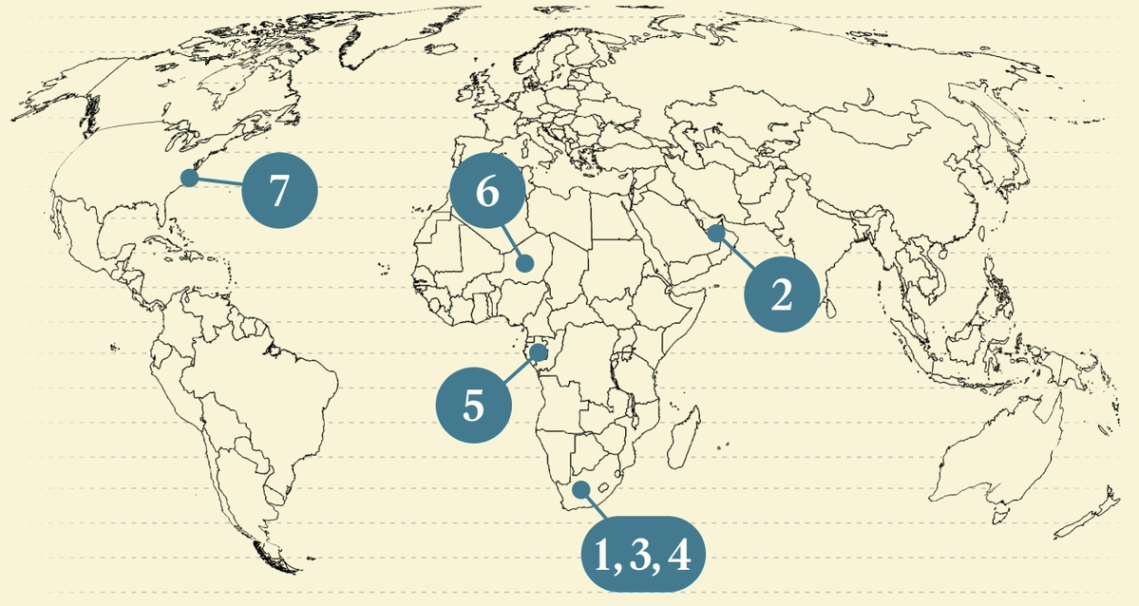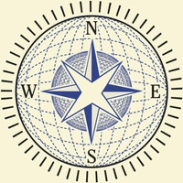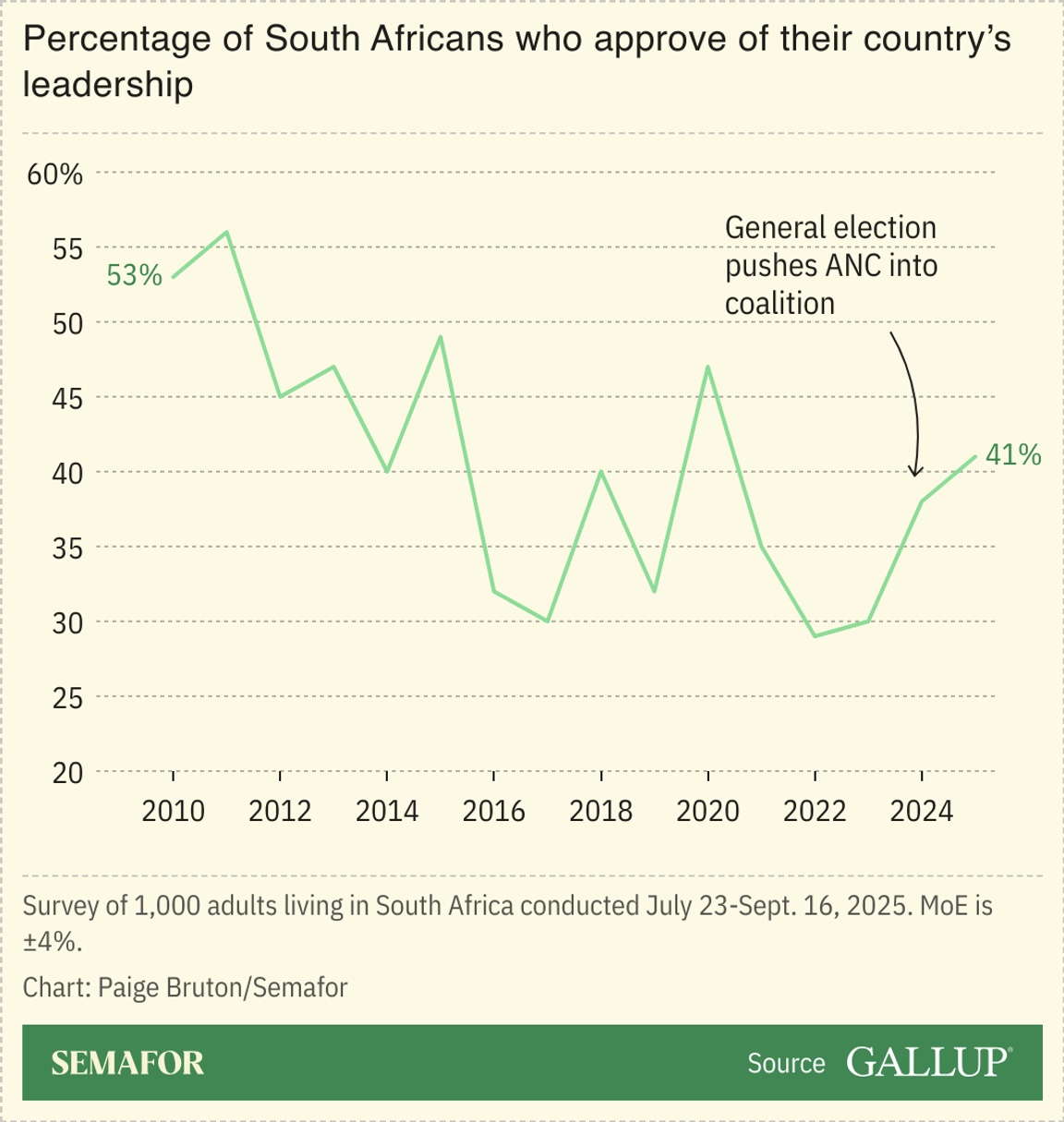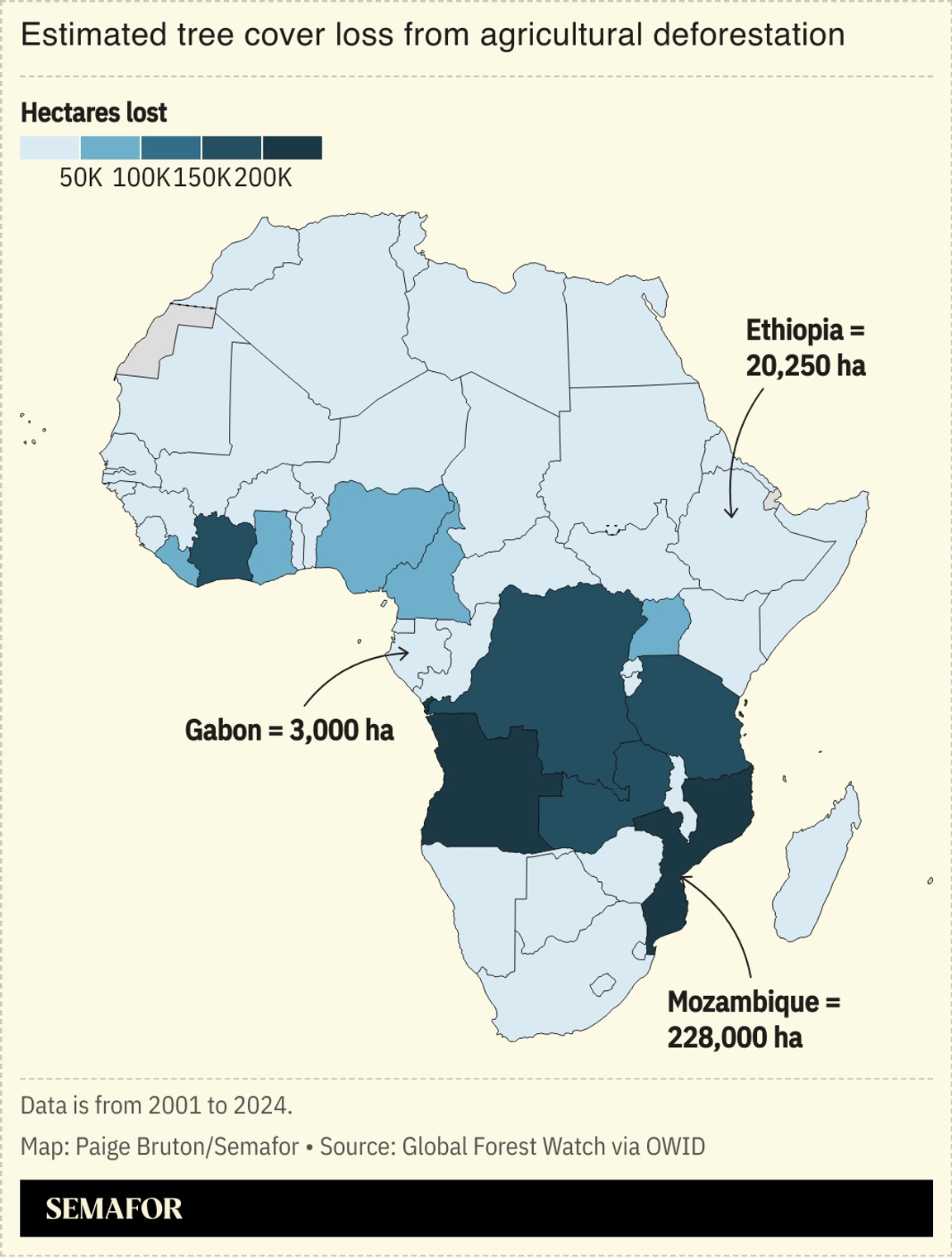| | In this edition: Unraveling the G20, Gabon strikes a nature deal, and a new anthology of African poe͏ ͏ ͏ ͏ ͏ ͏ |
| |   Johannesburg Johannesburg |   Libreville Libreville |   Niamey Niamey |
 | Africa |  |
| |
|
 - G20 renews multilateralism
- UAE’s $1B Africa AI pledge
- S. Africa’s call on minerals
- View on S. Africa’s leaders
- Gabon strikes nature deal
- Niger boosts connectivity
- Impact of US G20 no-show
 The Week Ahead, and a new poetry anthology. |
|
G20 ‘renews’ multilateralism |
 Leon Neal/Pool via Reuters Leon Neal/Pool via ReutersSouth Africa’s leadership successfully pushed through a “renewed commitment to multilateral cooperation” at this weekend’s G20 summit in the face of a boycott by the US, President Cyril Ramaphosa told delegates. The White House had pulled any US officials from attending as US President Donald Trump doubled down on disputed claims that South Africa’s government is persecuting its white minority. Trump had opposed South Africa’s agenda of supporting developing nations transitioning to clean energy, addressing their spiraling debt costs, and adapting to climate change-induced weather disasters. Envoys from the G20 drew up a draft leaders’ declaration on Friday without US involvement, sources told Reuters, a fact that upset the Trump administration, which described it as “shameful” that Pretoria had moved ahead without US input. Even though China’s Xi Jinping was absent, Eric Olander, editor of The China-Global South Project, argued that Chinese Premier Li Qiang “took full advantage” of the US boycott and shaped the final declaration in ways that “aligned with Beijing’s priorities on multilateralism, debt, and, most notably, critical minerals.” — Yinka Adegoke and Alexis Akwagyiram |
|
UAE pledges $1B to African AI |
 Sheikh Khaled bin Mohamed. Alexander Kazakov/Pool/AFP via Getty Images. Sheikh Khaled bin Mohamed. Alexander Kazakov/Pool/AFP via Getty Images.The UAE plans to invest $1 billion in artificial intelligence in Africa. The initiative was announced over the weekend at the G20 summit by Sheikh Khaled bin Mohamed, Crown Prince of Abu Dhabi, who led the UAE delegation to the talks. The UAE isn’t a member but was invited as a guest. Spending will support African countries in delivering projects in education, agriculture, health care, digital identity, and climate adaptation. The UAE is pouring billions into becoming a global AI leader and has already signed digital infrastructure agreements with several African countries, including Egypt and Kenya. Now the fourth-largest investor in Africa, the UAE has thus far focused on developing renewable energy, logistics, and critical minerals. Its bilateral trade with the continent in 2024 reached $107 billion, a 28% increase from the previous year, Reuters reported. — Kelsey Warner |
|
S. Africa calls for minerals unity |
| |  | Sam Mkokeli |
| |
 Nqobile Dludla/Reuters Nqobile Dludla/ReutersAfrican countries should coordinate mining policies to avoid the continent becoming trapped in a cycle of low-value extraction, South Africa’s mining minister said. Gwede Mantashe, addressing a mining event on the sidelines of the G20 summit in Johannesburg, said regional governments and African institutions should work together on exploration, pricing, and processing, rather than each state negotiating alone with multinational companies and weakening the continent’s collective bargaining power. Mantashe urged African producers to “unite as a producing continent” and end what he called a “race to the bottom” in tax breaks and licensing concessions. A senior official in South Africa’s mining ministry, speaking on condition of anonymity, told Semafor that officials had discussed approaching a multilateral body, such as the African Union or UN, to explore what a continental mechanism could look like. Some estimates suggest Africa holds as much as 30% of known reserves of critical minerals used in the production of batteries for renewable energy. However, in a recent Semafor column, Accra-based policy expert Bright Simons said this share is actually less than 5%. |
|
S. African confidence in leadership grows |
 South Africans’ confidence in their country’s leadership has grown, a new poll suggested. A Gallup survey found that 41% of South Africans approve of their country’s leadership, up from 29% in 2022, which was one of the lowest readings on record. The research was carried out just over a year after the coalition government took office in the wake of the African National Congress losing its parliamentary majority for the first time since the end of apartheid in 1994. The findings were published ahead of the weekend’s G20 summit in Johannesburg, the first to be held on the continent. Hosting the G20 has “elevated” the global profile of Africa’s biggest economy “and offered [it] a chance to shape how African priorities are represented in international policymaking,” according to Gallup. Still, corruption in government and business remains a concern for South Africans. — Preeti Jha |
|
 Gabon agreed a partnership with US nonprofit The Nature Conservancy to unlock $200 million for conservation and community development investments over the coming decade. Through an initiative known as Gabon Infini, the country is looking to raise funding to protect millions of hectares of forests and ocean, and improve the management of lakes and wetlands. The move, announced last week, continues Gabon’s push for greater sustainability for its marine ecosystem. In 2023, Gabon and The Nature Conservancy collaborated on a debt-for-nature swap in which the country issued a $500 million bond to protect its coastline that is rich in fisheries and mangrove forests. The US government’s International Development Finance Corporation provided risk insurance for the project at the time. The Central African country is one of the world’s most forested nations: Nearly 90% of its territory is tropical rainforest and makes up much of the vast Congo Basin, the world’s largest carbon sink, which is often referred to as the lungs of Africa. — Alexander Onukwue |
|
Niger’s fiber optic network push |
 The length of a recently completed fiber optic cable network in Niger, financed by the African Development Bank Group for around $50 million. The cable, a step toward improving the West African country’s broadband connectivity, will run along its borders with Algeria, Benin, Burkina Faso, Chad, and Nigeria. Only about one in five Nigeriens use the internet, according to the International Telecommunication Union, lower than the continental average of around one in three. The new cable will aid “regional digital integration,” the AfDB said, while the fiber rollout will be complemented by the planned installation of a national data center as part of the bank’s Trans-Sahara Optical Fibre Backbone Project to build out broadband infrastructure to connect Algeria, Chad, Niger, and Nigeria. |
|
View: The fallout of the US no-show |
  South African President Cyril Ramaphosa. Leon Neal/Pool via Reuters. South African President Cyril Ramaphosa. Leon Neal/Pool via Reuters.South Africa delivered a powerful declaration at the end of the G20 summit but the US boycott raises concerns about how the nation will be treated once Washington takes over the presidency next month, argued a development expert in a column for Semafor. “The summit declaration was a critical win,” wrote Hannah Ryder, founder of Development Reimagined, a development consultancy. She was also a member of the Africa Expert Panel convened by South Africa’s G20 Presidency to advise on how to advance the continent’s development priorities. “But the story is not over,” she said, pointing to the absence of the US during the summit, including during what is normally an uneventful handover. “The underlying issue is a growing concern that Washington might choose to withhold South Africa’s invitation to Miami for the preparatory G20 meetings it hosts next year,” Ryder wrote. “This too would be pressure enacted by absence: not through sanctions or economic restrictions, but by denying South Africa the platform that underpins multilateral problem-solving.” |
|
|